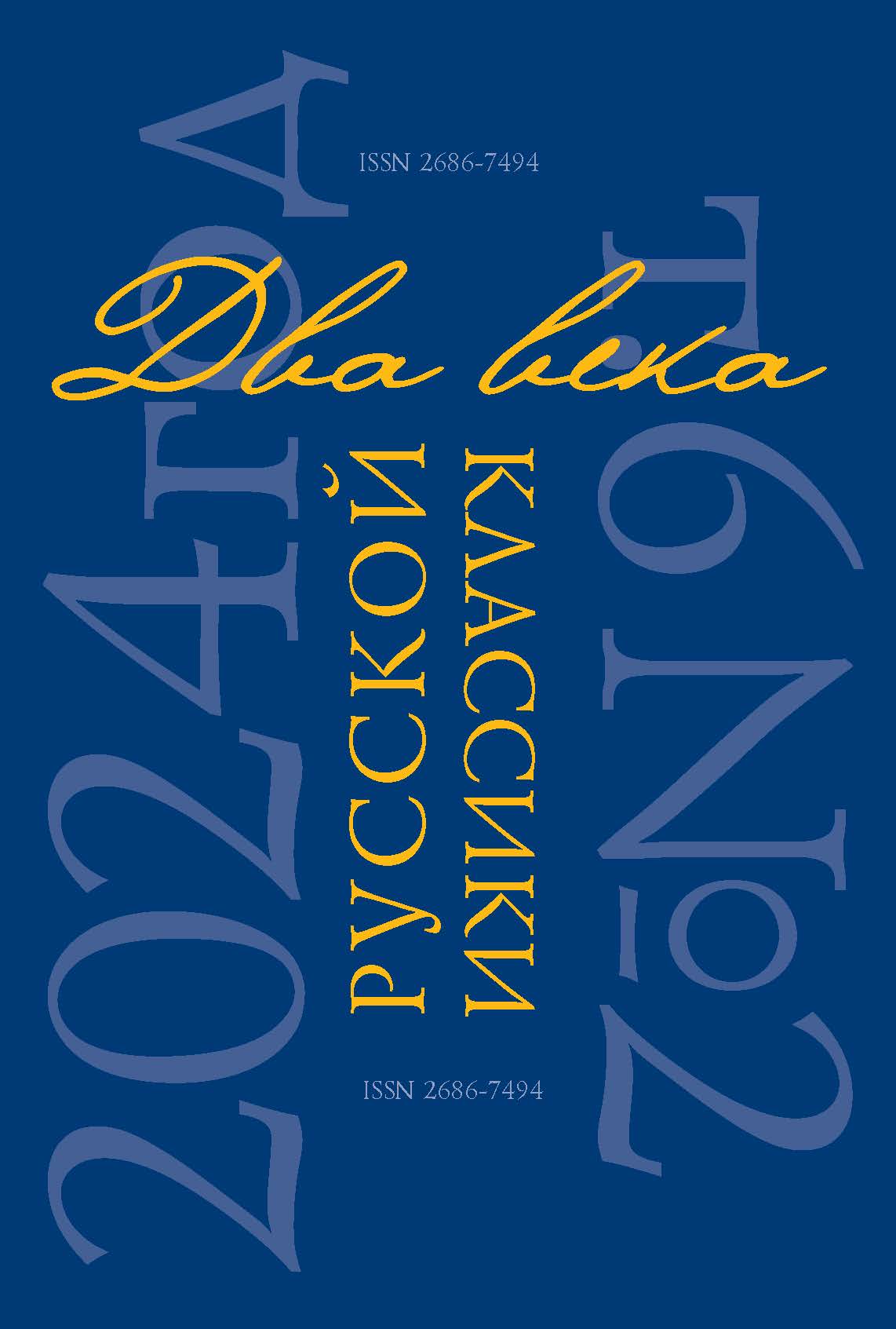Abstract:
The article argues that the historical factor of complicating the structure of the dramatic character is dominant. During the work on the comedy “Enough Stupidity in Every Wise Man,” N. A. Ostrovskii comprehended the new hero of post-reform Russia in the 1860s in the context of the opposition of the general (folk) and the personal in the transitional eras of Russian history. The literary factor in understanding a new hero relies on the experience of “eternal” images, such as Chatsky and Molchalin. According to the author of the article, their combination in the image of Glumov led to the creation of a holistic and original character with an expanded range of properties, including opposite ones. The author of the article concludes that the search for internal connections and attempts to identify transition situations between them determined the stages of the playwright’s work on the comedy from the first draft notes to the final text. For the first time, the article identifies new pretexts in the historical and literary context of the comedy of 1868 (at different stages of its writing).
References
Bem, A. L. “ʽGore ot uma’ v tvorchestve Dostoevskogo” [“ʽWoe from Wit’ in Dostoevsky’s Art”]. Vokrug Dostoevskogo: v 2 t. [Around Dostoevsky: in 2 vols.], vol. 1: O Dostoevskom: sbornik statei [About Dostoyevsky: Collected Articles], ed. by A. L. Bem, comp., introd. article and comm. by M. Magidova. Moscow, Russkii put’ Publ, 2007, pp. 415–429. (In Russ.)
Bilinkis, Ia. S. “Chelovek bez nravstvennykh ogranichenii (Opyt A. N. Ostrovskogo ʽNa vsiakogo mudretsa dovol’no prostoty’)” [“A Man Without Moral Restrictions (A. N. Ostrovsky’s ʽEnough Stupidity in Every Wise Man’)”]. Analiz dramaticheskogo proizvedeniia [The Drama Analysis]. Leningrad, Leningrad State University Publ., 1988, pp. 212–226. (In Russ.)
Grishunin, A. L. “Ostrovskii i Griboedov” [“Ostrovsky and Griboedov”]. Nasledie A. N. Ostrovskogo i sovetskaia kul’tura [A. N. Ostrovsky’s Heritage and Soviet Culture]. Moscow, Nauka Publ., 1974. pp. 77–92. (In Russ.)
Diachuk, T. V. Tvorchestvo G. I. Uspenskogo v istoriko-literaturnoi perspektive: kontekst i poetika [G. I. Uspensky’s Creative Work in Historical and Literary Perspective: Context and Poetics]. St. Petersburg, Herzen State Pedagogical University Publ., 2023. 348 p. (In Russ.)
Ermolaeva, N. L. “Obraz geroia v dramaticheskikh khronikakh A. F. Pisemskogo (‘Poruchik Gladkov’) i A. N. Ostrovskogo (‘Tushino’)” [“The Image of the Hero in the Dramatic Chronicles of A. F. Pisemsky (‘Lieutenant Gladkov’) and A. N. Ostrovsky (‘Tushino’)”]. Vestnik Kostromskogo gosudarstvennogo universiteta, vol. 22, no. 5, 2016, pp. 120–125. (In Russ.)
Zhuravleva, A. I. “Novoe mifotvorchestvo i literaturotsentristskaia epokha russkoi kul’tury” [“New Myth-Making and the Literary-Centric Era of Russian Culture”]. Vestnik Moskovskogo universiteta. Seriia 9: Filologiia, no. 6, 2001, pp. 35–43. (In Russ.)
Lakshin, V. Ia. “ʽMudretsy’ Ostrovskogo — v istorii i na stsene” [“ʽWise Men’ by Ostrovsky in History and on Stage”]. Novyi mir, no. 12, 1969, pp. 208–244. (In Russ.)
Lakshin, V. Ia. Biografiia knigi [Book’s Biography]. Moscow, Sovremennik Publ., 1979. 507 p. (In Russ.)
Liapina, L. E. Lektsii o russkoi liricheskoi poezii: Klassicheskii period [Lectures about Russian Lyric Poetry: Classical Period]. St. Petersburg, Petersburg Printing Institute Publ., 2005. 160 p. (In Russ.)
Markovich, V. M. “ʽGore ot uma’ v kritike i literaturovedenii XIX–XX vv.” [“ʽWoe from Wit’ in Criticism and Literary Studies of the 19th–20th Centuries”]. “Vek nyneshnii i vek minuvshii…”: Komediia A. S. Griboedova “Gore ot uma” v russkoi kritike i literaturovedenii [“The Present Century and the Past…”: Comedy “Woe from Wit” by A. S. Griboyedov in Russian Criticism and Literary Studies]. St. Petersburg, Azbuka-klassika Publ., 2002, pp. 7–44. (In Russ.)
Markovich, V. M. “Komediia v stikhakh A. S. Griboedova ʽGore ot uma’.” [“A. S. Griboyedov’s Verse Comedy ʽWoe from Wit’.”] Analiz dramaticheskogo proizvedeniia [The Drama Analysis]. Leningrad, Leningrad State University Publ., 1988, pp. 59–108. (In Russ.)
Meshcheriakov, V. P. A. S. Griboedov: Literaturnoe okruzhenie i vospriiatie (XIX — nachalo XX vv.) [A. S. Griboyedov: Literary Environment and Perception (19th – Early 20th Centuries)]. Leningrad, Nauka Publ., 1983. 267 p. (In Russ.)
Mikhnovets, N. G. “Dostoevskii i A. N. Ostrovskii v protsesse poznaniia naroda (1860-e gg.)” [“F. M. Dostoevsky and A. N. Ostrovsky in the Process of Understanding the People (1860s)”]. Vestnik Sankt-Peterburgskogo universiteta. Iazyk i literatura, vol. 18, no. 3, 2021, pp. 460–478. https://doi.org/10.21638/spbu09.2021.303 (In Russ.)
Mikhnovets, N. G. “Istoriia i osobennosti ʽvozrozhdeniia’ ʽvechnogo obraza’ (na primere komedii A. N. Ostrovskogo ʽNa vsiakogo mudretsa dovol’no prostoty’)” [“History and Features of the ʽRevival’ of the ʽEternal Image’ (On the Example of A. N. Ostrovsky’s Comedy ʽEnough Stupidity in Every Wise Man’)”]. Universalii russkoi literatury: sbornik statei [Universals of Russian Literature: Collection of Articles]. Voronezh, Voronezh State University Publ., 2019, pp. 380–390. (In Russ.)
Kholodov, E. G. Dramaturg na vse vremena [Playwright for All Time]. Moscow, Vserossiiskoe teatral’noe obshchestvo Publ., 1975. 424 p. (In Russ.)
Chernets, L. V. “Personazhi” [“Characters”]. Ovchinina, I. A., editor. A. N. Ostrovskii: Entsiklopediia [A. N. Ostrovsky: Encyclopedia]. Kostroma, Shuya, Shuya State Pedagogical University Publ., 2012, pp. 313–316. (In Russ.)









